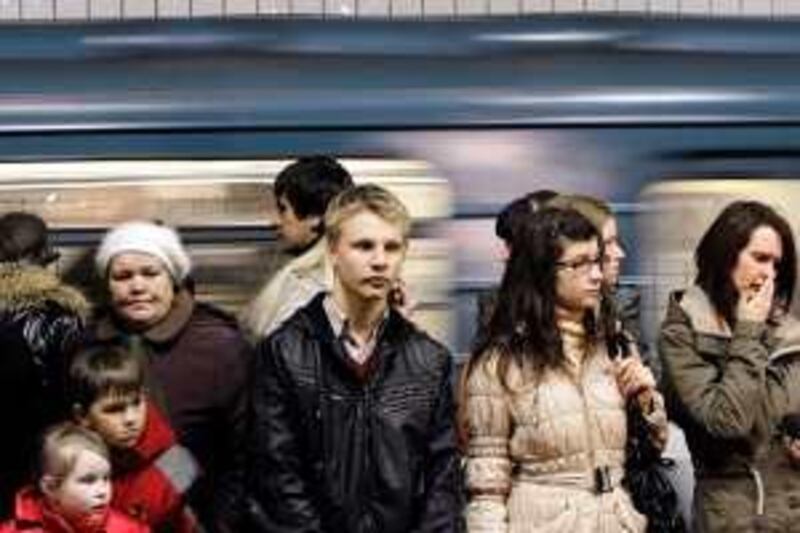MOSCOW // The Malaysian medical student Sim Eih Xing has classes at various hospitals throughout the Russian capital. The only way he can keep up with his studies is to journey across the expansive city on its famed metro, an exhaustive network of underground railways as celebrated for its beauty as for its efficiency.
Mr Sim, 23, would have good reason to eschew the Moscow metro in favour of above ground transport. He had just left the train at the Park Kultury station on the morning of March 29 when a girl standing next to him - since identified by Russian investigators as 17-year-old Dzhanet Abdurakhmanova - blew herself up, killing 14 people and injuring many. The attack followed a bombing 45 minutes earlier at the Lubyanka station, several stops away on the same line, that killed dozens. As of yesterday, 40 people had died as a result of the attacks.
"There was a bright flash on my left and a very loud explosion, so loud that I thought it made me deaf," Mr Sim said. "I didn't panic at all. It was very strange. After walking for three or four seconds, I turned around and saw bodies lying on the platform and in the carriage. Everything was so chaotic." Despite his harrowing experience, Mr Sim, like millions of residents of the Russian capital, continues to ride the Moscow metro every day, shrugging at the security concerns sparked by the twin bombings, the worst terrorist attack in Moscow in six years. "It's a necessity of my daily life," said Mr Sim, who expects to graduate in June, after which he plans to return to Malaysia. "The metro is the only efficient way for me to get to my classes."
Investigators said the attacks were carried out by two young women linked to the radical Islamist insurgency in Russia's turbulent North Caucasus. Authorities confirmed the identity of the Lubyanka station bomber yesterday as Maryam Sharipova, 28, a teacher from Dagestan. Sharipova's father had told investigators he recognised his daughter in photographs of one of the attackers. Abdurakhmanova was a widow of an Islamist militant slain by government forces, while Sharipova's husband leads a band of insurgents in the North Caucasus, authorities say.
Many Muscovites have said they are avoiding the underground because of safety concerns. But a week after the attacks, life on the Moscow metro appears to be returning to normal. Metro officials said the number of passengers was down 17 per cent the day after the attack but climbed back to just six per cent below the daily norm two days after the bombings. Between eight and nine million passengers travel on the metro every day, according to officials. A woman who answered the telephone at the Moscow metro press service said she did not have figures for this week indicating whether ridership had returned to its regular levels since the attacks.
On Monday, exactly a week after the suicide bombings, it was a typical scene on the Moscow metro's busy circle line, which connects all of the system's other lines. The platform at the Novoslobodskaya station was so crowded that many passengers were unable to squeeze into the packed carriage and had to wait for the next train. Teenagers bopped their heads to their iPods, old women tugged rusty pull-carts behind them and middle-aged men sitting on the carriage benches dozed or flipped through novels.
Dressed sharply in a dark suit and overcoat and clutching the metal railing overhead as the train rumbled down the tracks, Igor Zaslonov, a Moscow lawyer, said he had just travelled across town to deliver case materials to prosecutors. Mr Zaslonov, 42, said the metro was the only viable transport option given the notorious gridlock on Moscow's roads and the punctuality demands of Russian judges. "I can't be even five minutes late to a court hearing," he said. "With the metro, you know more or less what time you will arrive. With Moscow traffic, it's a lottery."
Following the bombings, Mr Zaslonov said his wife instructed him to avoid the metro. "But I had to get to the bank urgently," he said. "What are you going to do?" Shortly after the attacks, reports appeared in the Russian blogosphere claiming that Moscow's fleet of legal and illegal taxis were charging exorbitant rates to those opting to avoid the metro. The reports were followed by an appeal by Vladimir Putin, the Russian prime minister, asking taxi drivers "not to exploit the situation, not to inflate prices, not to create additional difficulties, but instead display solidarity with people who have found themselves in a difficult situation", the state-run Itar-Tass news agency reported.
There were also several reports of taxi drivers and regular citizens driving passengers to their destinations for free on the day of the attacks. Dmitry Medvedev, the Russian president, issued a decree on Monday ordering the implementation within four months of a "comprehensive programme" to boost transportation security, "above all on the metro and other forms of public transit". Mr Sim, meanwhile, said he would continue descending into the cavernous metro system in order to attend his classes, despite his brush with death on the metro platform that incredibly left him with just minor injuries.
"I'm not afraid of taking the metro at all," he said. "I believe God is protecting me. He always does." foreign.desk@thenational.ae






